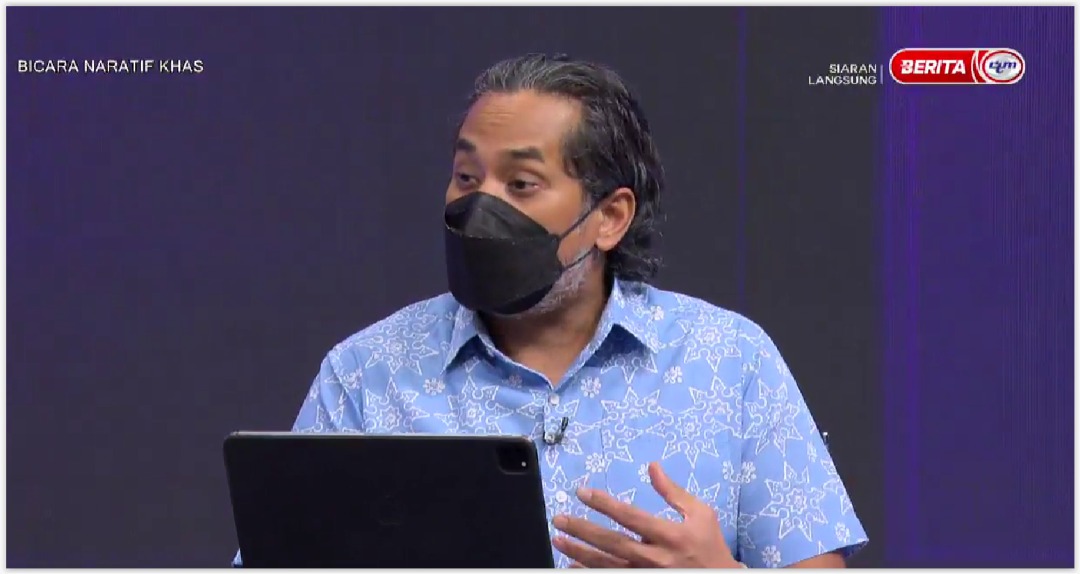KUALA LUMPUR, Dec 12 — Khairy Jamaluddin plans to table an amendment to the Prevention and Control of Infectious Diseases Act 1988 (Act 342) this Thursday to increase the maximum compounds of offences to RM10,000 for individuals and RM1 million for companies or agencies.
Act 342 — which is used to regulate infectious diseases like dengue and tuberculosis, not just Covid-19 — currently limits compounds of offences to RM1,000 and does not distinguish offenders between individuals and corporate bodies.
The health minister will also propose to Parliament to amend general penalties under Act 342 for convictions to a maximum RM2 million fine for corporations or government agencies.
Khairy did not specify at an interview with RTM’s Bicara Naratif programme today his proposed amendment to Act 342 in the Dewan Rakyat this Thursday on penalties upon conviction for individuals.
Section 24 of Act 342 does not specify the quantum of fines upon conviction, stating only a jail term not exceeding two years, or a fine, or both for a first offence, as well as imprisonment of up to five years, or a fine, or both for a second or subsequent offence.
“The maximum compound under the Act that will be amended for organisations — like companies, government agencies, and others — is RM1 million, but there are guidelines,” Khairy said.
“It’s not like we will be power-hungry and issue RM1 million [compounds] to everyone. We will look at each individual case, or certain cases.
“What is behind our intention to impose RM1 million [compounds] to everyone — before this, it was RM50,000 only — this RM1 million is more for repeated offences among large companies, for example, large companies involved in manufacturing that always experience [Covid-19] clusters.
“Their annual profits are in the billions of ringgit. If I give an RM50,000 compound, it’s nothing to them; it’s not preventive and it won’t change their behaviour. But if the compound is RM1 million, they’ll think two or three times.”
The health minister said that the proposed new compound under Act 342 for individuals would be RM10,000, underpinned by “guidelines”, like under the Emergency Ordinance (EO). The repeal of the EO was repealed by the Senate on December 8, which means all offences under Act 342 from that date could only be subject to a maximum RM1,000 compound.
“We will have tight guidelines. We don’t want traders and burger sellers to get RM10,000 [compounds]. We will have very clear guidelines. Maybe light offences will be RM1,000; repeated offences will be higher. So the guideline is very important.
“Even before this, under the Emergency Ordinance, we had guidelines because many people complained that traders got RM10,000 [compounds], that’s not fair. So we have guidelines, maybe traders will get a lower compound and those who are wealthier may get a higher compound.”
Khairy also mentioned he would propose other amendments to Act 342 besides revising the penalties for offences.
“There are many things we learned from the Covid-19 pandemic that require amendments to the Act, such as home quarantine and the like. This is not in the mother Act,” he said.
“Secondly, we want to impose the wearing of trackers during quarantine supervision. Thirdly, the devolvement of powers to officers. Currently, it’s in the regulations, the ministry can empower anyone for enforcement. But we want to put this in the Act. For example, not just MOH (Ministry of Health) enforcement officers, but local council enforcement officers can also enforce Act 342.”
When RTM asked about the possibility of the public questioning if an RM1 million compound under Act 342 was too high, Khairy said he would brief MPs tomorrow that even though the proposed general penalty upon conviction for companies was RM2 million, with proposed compounds at RM1 million, “we will have very, very stringent guidelines so that there will be no abuse of power by enforcers; enforcers don’t like, they issue an excessive compound.”
“So the guideline is very important and must be followed by enforcers. That is a guarantee that we must give.”
Despite Khairy’s reassurances, throughout the past two years, the police have repeatedly imposed the maximum compound for violations of Covid-19 standard operating procedures (SOPs) like mask wearing and physical distancing. A student was fined in August last year RM1,000 just for pulling down his face mask to the chin.
Police also reportedly issued 44 compounds worth RM220,000 on patrons of an entertainment centre in Kuala Lumpur (which amounts to RM5,000 per person), as well as an RM25,000 compound on the owner of the facility, on December 9, even though the repeal of the EO was gazetted the day before.
Inspector-General of Police (IGP) Acryl Sani Abdullah Sani was seen, in a video by national newswire Bernama, visiting a booth while surrounded by crowds of people at the “100-Day Aspirasi Keluarga Malaysia” event at the Kuala Lumpur Convention Centre earlier today that was organised by the Prime Minister’s Department. Bernama deleted its tweet after several people called out the violation of physical distancing rules by the country’s national police chief.
Khairy admitted today that the breach of SOPs at the government event took a “huge hit” on the government’s credibility. MOH issued last Friday a maximum RM1,000 compound on the Shared Prosperity Delivery Unit (Sepadu) under the Prime Minister’s Department as organiser of the Keluarga Malaysia event.
The health minister explained to RTM that MOH could not impose a higher compound on the organiser of the four-day event that saw tens of thousands of attendees because of limits under Act 342 that he now plans to amend this Thursday.
He did not address the IGP’s breach of physical distancing SOPs at the event earlier today.








